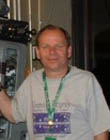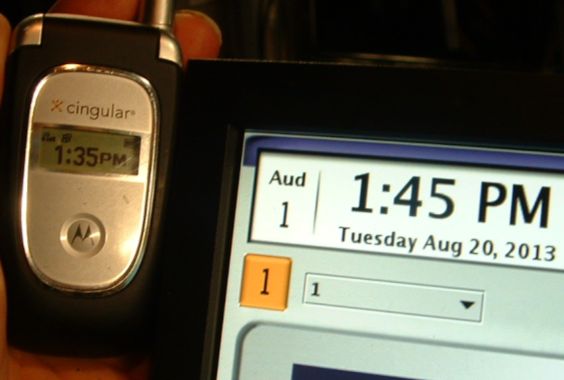|
|
This topic comprises 3 pages: 1 2 3
|
|
Author
|
Topic: How common are NTP servers on theater networks?
|
|
|
Carsten Kurz
Film God
Posts: 4340
From: Cologne, NRW, Germany
Registered: Aug 2009
|
 posted 03-16-2013 06:50 PM
posted 03-16-2013 06:50 PM




What do you mean with 'on your network'? Most screens I know of have their servers set to use any general use external NTP server, which makes sure that no larger deviations between the clocks (system/media block) accumulate. Doremi has that option, too. I guess any server has NTP options, even if not documented.
If access to external networks is not allowed or possible for security reasons, an internal NTP server would either need it's own radio oder GPS clock source, or be slaved to an external NTP server. But the latter would also mean a more or less controlled/firewalled access to external networks. So basically I don't see a large difference between using external NTP servers or internal NTP servers. Both need to be set up properly through network devices to accomplish security constraints.
Of course, it's one thing to have all servers on a multiplex synchronized to each other just internally, so that e.g. show starts and housekeeping is running on the same clock, and another thing to have it synced to an absolute external time reference. In some cases, the internal-only option may be sufficient.
- Carsten
| IP: Logged
|
|
|
|
|
|
Steve Guttag
We forgot the crackers Gromit!!!

Posts: 12814
From: Annapolis, MD
Registered: Dec 1999
|
 posted 03-16-2013 11:05 PM
posted 03-16-2013 11:05 PM




We have found that without an NTP clock, time will drift so we ensure that there is an NTP server locally in each theatre. This will be a TMS that references an external NTP or in smaller plexes (including singles) a PC that will function as an NTP.
It is true that Dolby servers CAN function as an NTP BUT the server acting as an NTP server for other things must have a good NTP source it can reference from.
In a proper Dolby network, it is set up as a spoke-and-wheel. At the center is the TMS/LMS (typically a DSL100 or DSL200). The DSL should have access to an external NTP source (like a NOC's NTP clock or even one like "NIST"). Each server within the complex then references its clock from the DSL. At that point, each individual server will broadcast NTP time for other clients to read the time.
Note, in the Dolby scheme each auditorium is an island and the DSS server acts as the bridge between the individual auditoriums and the theatre as a whole. Thus, any device within the specific auditorium can only "see" as far as its DSS server. The DSS server has to provide the NTP time at that point.
Dolby creates many small networks in this system...which should provide a very robust system since each network is relatively small and has much less traffic than a typical large or flat network.
To use NTP as an example...lets say you have a 10-plex. The DSL gets the time from an external source. Only one device is pinging the external NTP...which keeps traffic down going to the Internet and also keeps the external NTP from seeing a site being over zealous in consuming resources asking for time (also known a "flooding"). The DSL in this situation only has 10 things asking for the time of it...again, not too much traffic. And at each auditorium only a handful of things (at most) would be asking for the time (projector, sound processor, automation and maybe a couple other devices, in a fancy system). In each network, traffic is kept small and reliable. It also means that within an auditorium, if they all reference off of the server's clock, all devices have the same relative time...which for troubleshooting, can be a huge help.
I have found that without an NTP...none of the servers will keep accurate enough time and there will be drift. All DCinema server manufacturers have a means of NTP synchronization but I don't believe all can act as an NTP server. I don't think any of the other DCinema server companies came up with the type of network like Dolby...where it was incumbent on the cinema server to also handle NTP as well as have an internal router.
| IP: Logged
|
|
|
|
|
|
|
|
|
|
|
|
|
|
|
|
|
|
|
|
|
|
|
|
All times are Central (GMT -6:00)
|
This topic comprises 3 pages: 1 2 3
|
Powered by Infopop Corporation
UBB.classicTM
6.3.1.2
The Film-Tech Forums are designed for various members related to the cinema industry to express their opinions, viewpoints and testimonials on various products, services and events based upon speculation, personal knowledge and factual information through use, therefore all views represented here allow no liability upon the publishers of this web site and the owners of said views assume no liability for any ill will resulting from these postings. The posts made here are for educational as well as entertainment purposes and as such anyone viewing this portion of the website must accept these views as statements of the author of that opinion
and agrees to release the authors from any and all liability.
|

 Home
Home
 Products
Products
 Store
Store
 Forum
Forum
 Warehouse
Warehouse
 Contact Us
Contact Us




 Printer-friendly view of this topic
Printer-friendly view of this topic









![[Roll Eyes]](rolleyes.gif)








